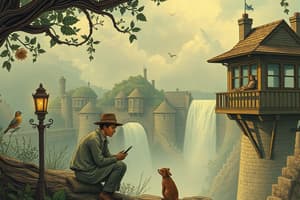Podcast
Questions and Answers
What theme in Huck Finn deals with America's struggle with racism and the effects of slavery?
What theme in Huck Finn deals with America's struggle with racism and the effects of slavery?
- Racism and Slavery (correct)
- Intellectual and Moral Education
- Childhood
- Superstitions and Folk Beliefs
What does the theme of 'Intellectual and Moral Education' in Huck Finn depict?
What does the theme of 'Intellectual and Moral Education' in Huck Finn depict?
An individual's maturation and development.
The Hypocrisy of 'Civilized' Society theme suggests that society is governed by illogical rules.
The Hypocrisy of 'Civilized' Society theme suggests that society is governed by illogical rules.
True (A)
How does Huck's childhood influence his moral education in the novel?
How does Huck's childhood influence his moral education in the novel?
Which motif in Huck Finn involves the use of lies and scams?
Which motif in Huck Finn involves the use of lies and scams?
What is the significance of the Mississippi River in Huck Finn?
What is the significance of the Mississippi River in Huck Finn?
What does Jim's belief in superstitions and folk tales represent in the novel?
What does Jim's belief in superstitions and folk tales represent in the novel?
Who is a character that bases his actions on romantic literary models in Huck Finn?
Who is a character that bases his actions on romantic literary models in Huck Finn?
Flashcards are hidden until you start studying
Study Notes
Racism and Slavery
- Racism severely affected America, particularly in the South, during the late 19th century.
- The aftermath of slavery persisted, with ongoing struggles in race relations.
- Reconstruction efforts faced challenges, leading to the establishment of Jim Crow laws, which further marginalized black individuals.
- Twain uses slavery as an allegory to illustrate the ongoing plight of African Americans, highlighting that abolition did not equate to equality.
Intellectual and Moral Education
- The narrative focuses on the theme of personal growth and maturation through Huck's experiences.
- Huck's journey represents a significant evolution in his understanding of morality and society.
The Hypocrisy of "Civilized" Society
- Surrounding society is depicted as governed by irrational rules and moral failings.
- Examples of this hypocrisy include the judicial system allowing Huck to remain with his abusive father, Pap.
Childhood
- Huck's youth plays a crucial role in his moral development throughout the story.
- His open-mindedness is essential for the transformative experiences he undergoes on his journey.
Lies and Cons
- The novel presents a variety of deceitful schemes, particularly through characters like the duke and the dauphin.
- Although lies generally cause harm, Huck also uses deception for protective purposes, such as when he misleads slave-hunters to safeguard Jim.
Superstitions and Folk Beliefs
- Jim expresses a range of superstitions that initially seem irrational but often relate to real events.
- This motif reflects deeper truths and insights into life events that are revealed through Jim's beliefs.
Parodies of Popular Romance Novels
- Characters in the novel often emulate the tropes found in romantic literature, influencing their actions and decisions.
- Tom Sawyer is a primary example, as he adopts narratives from adventure novels, demonstrating how fiction shapes perceptions of reality.
The Mississippi River
- The river symbolizes the ultimate freedom for Huck and Jim.
- Their time spent alone on the raft represents a physical and emotional escape from societal constraints.
Studying That Suits You
Use AI to generate personalized quizzes and flashcards to suit your learning preferences.




